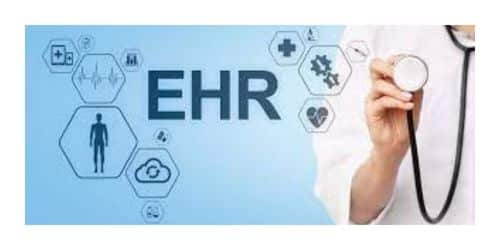Medical practices of all sizes and specialties have been using medical software to manage their patients and caregivers for the past ten years. As a result, the benefits of electronic health records are becoming more apparent to users of Ehr software. The reason for this increase in usage is due to the numerous benefits of electronic health records, which we’ll go over in this essay. In the course of this article, we will learn about EHR systems, revolution, its differences in EMR (EMR vs EHR) and benefits.
But let’s first define what an Ehr and revolution Ehr is. Let us continue…
EHR
A patient’s paper medical record is converted to a digital one through an electronic health record (EHR). EHRs are real-time records that are patient-centered and provide authorized users with quick, secure access to information.
A patient’s whole medical history is typically stored in computer software. The demands of both the practitioner and the patient are met by EHRs, which revolutionize practices. The efficiency gains from improved workflows and information accessibility are one of the key arguments for having everything on a single computer system.
EHR Systems
There could be a wide range of unique EHR system configurations. Each has benefits and drawbacks depending on the individual demands and requirements of a medical practice
#1. Physician-Hosted EHR Systems
In essence, physician-hosted systems imply that all data is stored on the doctor’s private servers.
This implies that a physician is in responsible of making hardware and software purchases, as well as caring for and safeguarding the information kept on their servers.
For larger practices that can afford the overhead costs of the complicated software, a physician-hosted EHR system may be beneficial. The stability and speed of an EHR system are increased by having on-site servers.
#2. Remotely-Hosted EHR Systems
Solutions that are remotely hosted grant access to the doctor’s data storage to a third party.
This business is in charge of security, backup, and maintenance. With the use of this technology, a different entity rather than just one doctor or medical practice will be in charge of maintaining the data. Smaller practices or any healthcare provider that wants to concentrate more on gathering the information than on keeping it may find this change in responsibilities desirable. Some of the IT issues that can impede a doctor from giving their patients the care and attention they deserve are resolved using this technique.
#3. Remote EHR Systems
Three different categories of remote Ehr systems exist.
EHR systems are referred to as “sponsored” if they receive funding from a third party. Usually, after coming to this agreement with a doctor, a hospital is in charge of the data. Remember that a remote system involving a supported company may result in a number of legal issues, including possible antitrust breaches and issues with data ownership.
In a dedicated host system, doctors maintain their EHRs on a vendor’s servers. These servers are regularly observed in particular places. The majority of data storage considerations under this technique are outside the doctor’s control.
The cloud, an online-based computer system, is one of the most widely used EHR remote solutions. Because a provider stores the information “in the cloud,” doctors do not need to retain it on their own servers. This demonstrates how the data is continuously and securely saved online and made accessible via the vendor’s website.
Revolution EHR
A cloud-based electronic health record (EHR) solution designed exclusively for optometry practices is called Revolution EHR. A complete EHR, medical billing, patient scheduling, medical accounting, and a picture archiving system are all included with Revolution EHR. Patients get access to vital information such as appointments, bills, medications, and other details through the Revolution EHR personal health record feature.
An integrated FDA pharmaceutical database and 2014 ONC-ATCB accreditation are both features of Revolution EHR. The practice management tool aids in the management of billing, scheduling, and bookkeeping for medical practices. The system can be used, among other things, to manage paperwork, maintain medical data, and process claim submissions. To keep track of their appointments, patients can use a website for their own health records.
The cost of Revolution EHR
The price of subscriptions: $439 per month (1st doctor) $309 monthly (2nd doctor) $189 monthly (3rd doctor) $129 monthly (each additional doctor)
Ehr Benefits
Electronic medical records have a variety of benefits. To make it easier to grasp, they have been taken out of the carers’ and beneficiaries’ perspectives.
Benefits of EHR for nurses
Here is how nurses can benefit from an Ehr.
#1.Simple Follow-Ups
Since all patient data is digitally collected in one location, nurses can easily maintain track of patients. The same logic applies when informing patients of upcoming appointments or drug schedules.
The advantages of EHR that allow nurses to focus more on patient care than paperwork are remarkable as a result.
#2.Tracking Patient Information is Simple
For nurses, organizing patient data can be difficult, especially when they are working with several doctors. Other things to keep in mind include allergies, blood types, previous treatments, and more.
So, one of the key benefits of EHRs is being able to manage all of that data on a single device.
Consequently, the records are constantly current and accessible, regardless of remote locations.
#3.Quicker Transfers of Patients
Nurses are well aware of the time and movement limits when moving a patient from one department to another.
For example, it must be done quickly—often within minutes—when shifting patients from a regular room to an emergency room. Every additional minute could be a death in such a circumstance.
Nurses only need to click a few times on the computer screen to obtain the benefits of EHR. And the appropriate individuals receive the information in a matter of seconds. Isn’t that incredible?
Advantages of EHR for Patients
EHR has many advantages for both patients and caregivers. Look at these!
#1. Fewer Prone to Mistakes
Computerized health records are more advantageous and less likely to include errors than handwritten records.
The likelihood of a misreading is quite low because they are computer-generated facts from medical records. Needless to mention that they are entirely readable and unaffected by the poor handwriting of a prescriber.
And that’s one of the main advantages of EMR that a lot of people want to obtain
#2. No Misunderstanding
Remote exchange of medical history is another advantage of electronic health records. Also, it allows doctors to swiftly review the patient’s whole medical history. likewise the exact opposite.
It was eventually feasible to perform a thorough analysis of the materials because to this wide-ranging access. This enables medical experts to select the optimal course of action.
Also, there is no risk of patients losing access to their medical records when they change providers
#3. Suitable for Emergency
It’s possible that patients aren’t always able to bring their medical documents with them. Or even events like car accidents, heart attacks, and natural disasters where patients are unable to offer medical information.
Emergency medical staff may occasionally be able to acquire crucial data from electronic health records that could save lives. And this might be one of the most important benefits of EHR.
#4. Detecting Data Thefts and Alterations with Ease
If a patient obtains an incorrect diagnosis or course of treatment, his EHR will always support the claim. It would be difficult for any dishonest entity to try to remove electronic records without authorization.
For example, it would be simple to track down the person who successfully deleted the data using their IP address and other online tools. And the offender will soon be apprehended. The EHR thus has several benefits.
EHR Benefits Medical Practice
Indeed! Medicine only involves patient care and pharmaceutical prescription. They manage physical and digital file collections. Hence, electronic health records simplify patient management and interaction.
#1. Less Paperwork and Storage
The handling and processing of forms, reports, and fill-outs takes up a significant portion of the workday for medical professionals and personnel. One of the best aspects of electronic health records is that they are paperless.
Also, having all the data they require at their fingertips enables them to maintain a productive job.
Also, they do not have to wade through a lot of entries or manually update them.
#2. Efficiency and Time Management
Employing an EMR has several advantages beyond simply having access to your data whenever you need it. Most EMRs also have beneficial functions like chart management and record searches that use simple queries rather than the memory of the names of particular entries.
These instruments allow medical facilities to treat more patients while saving a significant amount of time. Moreover, make prompt decisions regarding treatments or medical procedures.
#3.Profits
Either new hires or current staff need to receive training in order to transition to EHR. As a result, it makes logical to think about how medical professionals might handle the switch from their present system to EHRs.
Fortunately, a range of monetary incentives will aid the healthcare sector in adjusting to these changes. For instance, the healthcare sector can access authorized EHR technologies through CMS’s Medicare and Medicaid EHR Incentive Programs.
Hospitals are encouraged to enhance their services by using EHR as a result of these financial incentives.
#4. Administration Simplified
Even the administrative staff at medical offices may sigh with relief now that the EHR is in place. Everything they do will be simpler for them, from managing all healthcare data to monitoring patient progress.
They benefit from EMR because it gives them more time to concentrate on improving the quality and results of their healthcare services rather than on tiresome paperwork.
Emr vs Ehr
EHR vs EMR: Electronic medical records have been created from the paper patient charts that were once crucial to medical procedures (EMR). EHRs, or electronic health records, are more detailed. They include tools that improve the telemedicine, lab orders, and electronic prescription capabilities of your practice.
An EMR offers a digital replacement for the paper patient charts and medical records kept by a clinic.
An EHR system performs all of the functions of an EMR, positioning your practice for expansion and improved internal and external communication.
Differences Between EMR vs EHR
Below is a table differentiating between EMR VS EHR
| EHR | EMR |
| A digital repository for a patient’s medical records | A digital chart |
| A more effective way to communicate current, real-time data with other service providers, laboratories, etc. | – Not for dissemination outside the context of the specific practice |
| Makes it possible for a patient’s medical records to be mobile | Patient records have a hard time leaving the office. |
| Having access to data that can be used by medical professionals as a decision-making tool. | The majority of medical professionals employ it for both diagnosis and treatment. |
What Is an Example of an Ehr?
Age, gender, ethnicity, health history, medications, allergies, immunization status, lab test results, hospital discharge instructions, and billing information are just a few examples of the Ehr data that we collect.
What Are the 3 Components of the Ehr System?
Patient Management
Clinical Component
Secure Messaging and Alerts
What Are the 5 Components of the Electronic Medical Record?
Progress note entry
Data module input system
Patient call log.
Prescription management system
Backup system.
What Are 3 Advantages of Ehr?
- At the point of care, providing comprehensive, accurate, and current patient information.
- Facilitating easy access to patient records to assist in better coordination of treatment.
- Securely exchanging digital information with patients and other medical personnel.
Most Popular Ehr Software
- AdvancedMD is the best option for large group practices.
- NextGen is the best for outcomes in population health.
- Athenahealth Should Be Used by Large Healthcare Organizations.
- eClinicalWorks is the best for telehealth technology.
- Important: Excellent for Behavioral Health Practices.
- Cerner works best for businesses with several locations.
What Are Five Benefits of the Ehr?
- Delivering comprehensive, accurate, and current information to patients at the point of care
- Facilitating quick access to patient records for more coordinated and effective care
- Safe electronic data exchange with patients and other medical professionals
- Aiding medical professionals in patient diagnosis, safer treatment delivery, and a reduction in medical errors
- The availability of healthcare services, communication between patients and healthcare professionals,
- Enabling more dependable, safer prescription
- Supporting the expansion of clear, detailed documentation, precise, fast coding and billing, and promoting the enhancement of patient data security and privacy.
- Improving output and promoting providers’ work-life balance
- Assisting providers to become more effective and achieve their objectives
- Cost-saving measures include less paperwork, increased safety, fewer test retakes, and better health.
What Are the Types of Ehr?
- Dedicated EHR software.
- SaaS-based EHRs.
- EHR Custom Builds.
- EHR data storage on-site.
- Remotely Hosted EHR Data on Dedicated Servers.
- Accredited EHRs.
- Cloud-Based EHR Data Storage…
- Separate EHRs.
Related Articles
- IMPLEMENTING EHR: Definition, Process,Cost and Benefit
- EMR SYSTEMS: Meaning, Best Emr Systems & Training
- PATIENT DEMOGRAPHICS: Definition, Examples & Form
- PATIENT ENGAGEMENT: Definition, Software, Strategy & Solution
- REMOTE MONITORING: What It Is, Application and Jobs






